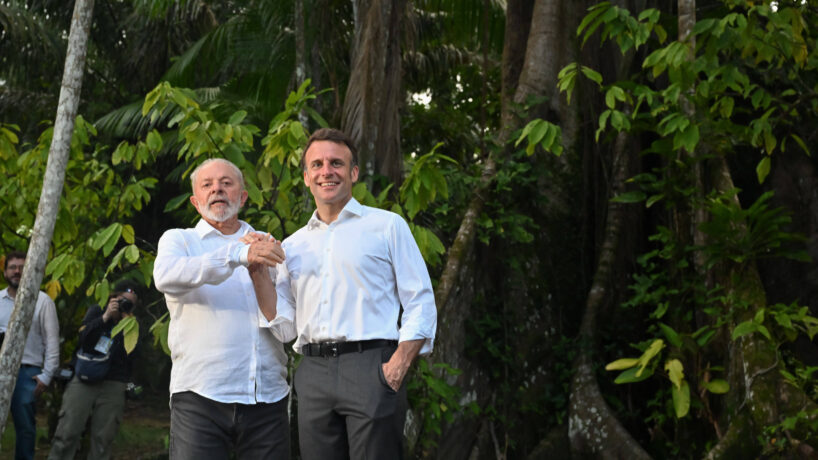Emmanuel Macron and Lula announced that they wanted to raise one billion euros in green investments for the Amazon. What is the scope of this environmental agreement between the two countries?
There are several stages in this visit. First of all, the environmental pillar, because it is natural between two neighboring countries. France has a 730 kilometer border with Brazil. And the Amazon does not only concern Brazil, but also France and its neighbors, a community of eight countries. France is at the forefront on environmental issues and this is the angle which allows us to build this strategic partnership which has been praised since the 2000s. First of all there was the Chirac presidency, then the Sarkozy presidency with a visit in Brazil much commented on at the time. Starting with this environmental part is interesting, because it is the current international subject, but because it is also part of a more global agenda. Emmanuel Macron's France has chosen to develop strong ties with Brazil, the leading South American power. A country that wants to be the leader – with Mexico – of Latin America tempted by the emergence of the Global South. So talking about financing the environment, recalling the common objective of reducing global warming, using this environmental issue to assert a new global governance, particularly in financial matters, is bilaterally obvious, but also and above all a way of keeping Lula, at the head of the ninth world economic power, in the reasonable camp.
This trip by the French President also marks a strategic partnership between France and Brazil on submarines. What is the state of relations between the two countries in terms of military cooperation?
This visit is the occasion for the commissioning of the third conventional propulsion submarine delivered by France to Brazil. It is a Prosub program launched by Nicolas Sarkozy and already Lula, with the “Lula II” presidency in 2008. The project involves 6.7 billion euros and provides for the delivery of four submarines: Ria cuela, Humaita, the Tonelero and Angostura, next year. They are all manufactured in Rio, so it was necessary to set up a base off the coast of Rio and shipyards. These submarines are produced as part of a partnership between the French company, Navalgroup, and the Brazilian company Novotos. It is a program which recalls the importance of Brazil, which is a country which has a defense industry, an aeronautics industry. Brazil is an industrial power. There is therefore a defense relationship behind it, but which also carries this image of defense of the environment. This is called the Blue Amazon. This maritime space, 8,500 kilometers of coastline, which carries an exclusive economic zone, extremely important for Brazil. This space accounts for 95% of the transit of its foreign trade and 95% of its oil production. It must therefore be secured. This awareness of environmental protection is in line with the French vision of blue diplomacy. But now, the Brazilians want more than these four submarines. The visit will therefore focus on a fifth nuclear-powered submarine this time. If France accepts, it could only be delivered in 2036-37. Then, we touch on the sensitive area of nuclear power, there is a problem that arises with regard to international law. Latin America and Brazil signed the Treaty of Tlatelolco in 1968, a nuclear non-proliferation treaty. So if Brazil moves forward on this issue, it would be a breach of the treaty. But in reality, this submarine already has a name… It would be called “Alvaro Alberto”. This partnership would send several messages. For France, a nuclear power and arms exporter, it could be seen as a snub to Aukus, the trilateral agreement between the United States, Great Britain and Australia. In the international context, this would be a nice media coup for France. A strong message, and it would mark the arrival of the nuclear fringe with the leading Latin American economy. In recent years, France has been criticized for making South America the forgotten continent of French diplomacy. Getting into sovereign issues, with nuclear power and nuclear defense would be a first. This type of technology anchors the relationship over time.
France is the fourth investing country in Brazil with more than 40 billion euros in direct investments. Conversely, the South American giant does not invest enough in France according to the Elysée.
There has been a difficult political dimension in recent years. Let us not forget that Jair Bolsonaro's mandate marked years of strong tensions with Brazil. There was even a personalization of these tensions since Bolsonaro attacked Emmanuel Macron by name. There was therefore not an adequate breeding ground for the development of economic partnership. Then, the agricultural issue, locked into free trade themes, complicates trade. So it goes beyond Franco-Brazilian. Furthermore, these investments must be qualified. The bulk of French investments were marked by dynamic years for Brazil. Since the 2000s, and we saw it with the Football World Cup in 2014 and the 2016 Olympic Games, a lot of infrastructure has been built with French companies, notably the aspect of rail transport, with Alstom, with the Rio tramway too, and a transfer of production technologies on site. The French in Brazil are also mass retailers, Carrefour has been very present in cities, and particularly in Sao Paulo, one of the largest megacities in the world. At the Brazilian level in France, there is in aeronautics, with Embraer, a Brazilian company, a desire to develop a presence in France. What you have to keep in mind is that it's not just the French market for Brazilians. France can open other French-speaking markets and establish a presence in Europe. Today, this corresponds to the Brazilian strategy, which wants to appear as a global power. France, by banking on Brazil, is with the leader of this global South. There is a desire to detach Brazil from this global South, while becoming an agent of influence inside.
Does Lula's return to power keep its promises in terms of warming trade with France?
The best proof is this visit. So yes and in several ways. First of all on the psychological level. His inauguration signified to heads of state the opening of a new world. Lula's return is already psychologically the possibility of starting a constructive relationship. For Brazil, France is also a country with which there is a strong, emotional, heartfelt relationship. We see the link on a cultural level: Brasilia, the capital, with French architects, is the construction of a new urban concept. France was a leader in supporting the construction of a new Brazil in the 1950s. In cinema too. The 60s, with Belmondo, Bardot, Delon, there was a close relationship between the two countries. Second, Emmanuel Macron can introduce France from above and over the long term. With nuclear power, it would be gone for decades. Ultimately, the relationship is complex, because the Brazilian mosaic is multiple. But the strategic partnership in the international environmental landscape would be win-win.
On the diplomatic level, however, significant disagreements exist, notably on the free trade agreement between the European Union and Mercosur, or even on the war in Ukraine. Can we hope for progress on these two points?
It is certain that these are subjects which will be discussed between the two heads of state. This will be part of the stage in Brasilia, on bilateral subjects, the subjects which irritate. Lula's position has been extremely criticized. He was very tough on Volodymyr Zelensky and on Ukraine. Let us remember that in January 2023, General Laura Richardson, commander in charge of American South Command, American troops for Latin America, called on countries with Russian equipment, Colombia, Peru, Brazil, to facilitate their shipment to Ukraine. This was an end to the Latin American countries' refusal to accept this proposal. Yes, these topics will be discussed. Macron will ask Lula to make efforts on the agricultural production line. It's going to be very difficult for Lula, because changing an entire sector doesn't happen overnight. And on Ukraine, it's the alternative Lula. It comes from a political movement which denounces the current international framework, which has not broken with Russia. Sergei Lavrov, head of Russian diplomacy, visited Brazil twice this year, before going to Venezuela and Cuba. Lula would dream of seeing Brazil serve as mediator during peace negotiations between the two countries. For the moment we are not in a time of negotiation, but Emmanuel Macron knows that Lula could be. This is an illustration of Brazil's balancing act.

